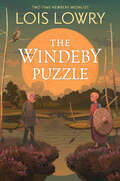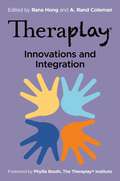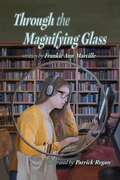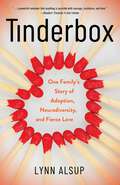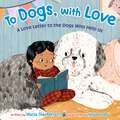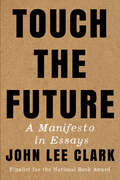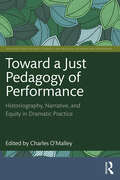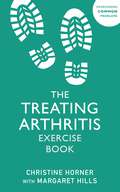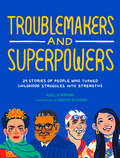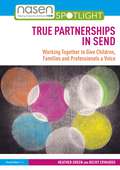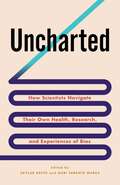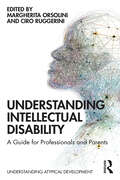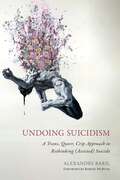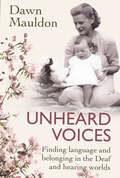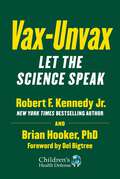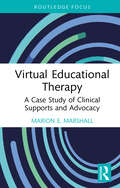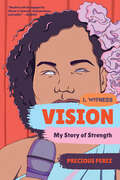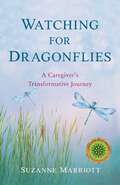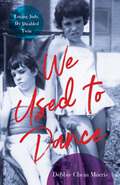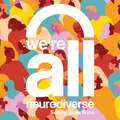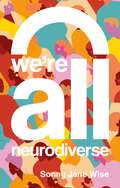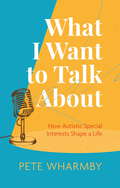- Table View
- List View
The Windeby Puzzle: History and Story
by Lois LowryNewbery Medalist and New York Times bestselling author Lois Lowry transports readers to an Iron Age world through the suspenseful dual narrative of a boy and girl both battling to survive. In an utterly one-of-a-kind blend of fiction and history, a master storyteller explores the mystery and life of the 2,000-year-old Windeby bog body. <p><p>Estrild is not like the other girls in her village; she wants to be a warrior. Varick, the orphan boy who helps her train in spite of his twisted back, also stands apart. In a world where differences are poorly tolerated, just how much danger are they in? <p><p>Inspired by the true discovery of the 2,000-year-old Windeby bog body in Northern Germany, Newbery Medalist and master storyteller Lois Lowry transports readers to an Iron age world as she breathes life back into the Windeby child, left in the bog to drown with a woolen blindfold over its eyes. This suspenseful exploration of lives that might have been by a gifted, intellectually curious author is utterly one of a kind. Includes several arresting photos of archeological finds, including of the Windeby child. <p> <b>New York Times Bestseller</b>
Theraplay® – Innovations and Integration (Theraplay® Books & Resources)
by Rana Hong and A. Rand ColemanOfficially endorsed by The Theraplay® Institute, this handbook builds on the core concepts of Theraplay® and explores innovative ways to integrate the approach with other therapeutic models for diverse settings and client groups. The book features chapters on the neurobiology of Theraplay®, Tele-Theraplay, and men in Theraplay®, as well as advice for working with traumatized children, neurodivergent children, intergenerational trauma, and homelessness. Throughout the handbook, you'll be encouraged to challenge the limits of your practice and discover new ways to approach challenges using techniques rooted in extensive research-based evidence. Contributions from a wide variety of specialists create a rich tapestry of expertise, providing practical recommendations for integrating Theraplay® with other modalities to give clients the best support for their unique needs.Essential reading for Theraplay® trainees, play therapy practitioners, and professionals working with children, this guide explains the practical applications of cutting-edge research and provides a flexible, effective approach to your practice.
Through the Magnifying Glass
by Patrick Regan Frankie Ann MarcilleJulia is just your average middle schooler. She loves spending time with her family and friends, reading, and listening to music or podcasts. She especially loves listening to old-school Sherlock Holmes radio shows on YouTube. But Julia doesn't feel like everyone else. Having a vision impairment sometimes makes her feel like she doesn't fit in anywhere. She's not totally blind, but she's not sighted either. Her family and teachers for the blind encourage her to use adaptive devices, like a white cane, or assistive technology, like a screen reader, to help her, but Julia has no interest. She wants to be just like everyone else, specifically her older brother, John, the town hero, most popular guy in high school, mystery-solving, John.
Tinderbox: One Family's Story of Adoption, Neurodiversity, and Fierce Love
by Lynn AlsupLynn watched her beloved Clare, newly adopted from Haiti, crawl the house in a frantic search for her lost mother. Preschool Clare enchanted with belly laughs and shining smiles. Also, thrashed and wailed in her room as Lynn crouched on her own bed—pillow clutched over her head—her past trauma triggered. A pre-teen trip to Haiti brought sunshine, ruby red hibiscus blooms, and the music of Haitian Creole. Back at home, Clare shattered mirrors into shards on the subway tiles of their bathroom. And just before her thirteenth birthday, as she and Lynn walked hand in hand through their neighborhood, Clare calmly detailed her plan to die.Over the next years, Lynn and her family walked through psychiatric hospitals, along the Appalachian Trail, and in and out of residential placements, marriage, faith, and sanity barely surviving the journey. But then Lynn learned about fetal alcohol spectrum disorder (FASD)—a source of neurodivergence in one in twenty American children—and discovered the FASCETS Neurobehavioral Model, a strengths-based approach to celebrating and accommodating neurodiversity. It was a discovery that transformed them all.At times joyous, at times harrowing, but always full of love, Tinderbox is a mother’s story of brokenness, unrelenting resilience, and hope.
To Dogs, with Love: A Love Letter to the Dogs Who Help Us
by Maria GianferrariA book for anyone who has ever loved a dog.Dear Dogs,Thank you for being there when we are sick, or hurt, or in trouble.Thank you for licks and hugs when we feel down, or just need to smile.Thank you for all that you do, for always being at our sides.This is our love letter to you!Give thanks to every human's best friend, in this sweet and inclusive ode to dogs of all kinds - with an emphasis on service dogs - written by animal expert Maria Gianferrari and illustrated by Ishaa Lobo.
Touch the Future: A Manifesto in Essays
by John Lee ClarkA revelatory collection of essays on the DeafBlind experience and the untapped potential of a new tactile language. Born Deaf into an ASL-speaking family and blind by adolescence, John Lee Clark learned to embrace the possibilities of his tactile world. He is on the frontlines of the Protactile movement, which gave birth to an unprecedented language and way of life based on physical connection. In a series of paradigm-shifting essays, Clark reports on seismic developments within the DeafBlind community and challenges the limitations of sighted and hearing norms. In "Against Access," he interrogates the prevailing advocacy for "accessibility" that re-creates a shadow of a hearing-sighted experience, and in "Tactile Art," he describes his relationship to visual art and breathtaking encounters with tactile sculpture. He offers a brief history of the term "DeafBlind," distills societal discrimination against DeafBlind people into "Distantism," sheds light on the riches of online community, and advocates for "Co-Navigation," a new way of exploring the world together without a traditional guide. Touch the Future brims with passion, energy, humor, and imagination as Clark takes us by the hand and welcomes us into the exciting landscape of Protactile communication. A distinct language of taps, signs, and reciprocal contact, Protactile emerged from the inadequacies of ASL—a visual language even when pressed into someone’s hand—with the power to upend centuries of DeafBlind isolation. As warm and witty as he is radical and inspiring, Clark encourages us—disabled and non-disabled alike—to reject stigma and discover the ways we are connected. Touch the Future is a dynamic appeal to rethink the meanings of disability, access, language, and inclusivity, and to reach for a future we can create together.
Toward A Just Pedagogy Of Performance: Historiography, Narrative, And Equity In Dramatic Practice (Routledge Series in Equity, Diversity, and Inclusion in Theatre and Performance)
by Charles O’MalleyThis book is a compendium of resources largely by and for artists and scholars interested in engaging in conversations of justice, diversity, and historiography in the fields of theatre and performance studies. For these students, and for the future instructors in our field who will use this book, we hold a tripartite hope: to expand, to enable, and to provide access. In its whole, we intend for this book to provoke its readers to question the narratives of history that they’ve received (and that they may promulgate) in their artistic and scholarly work. We aim to question methods and ethics of reading present in the western mode of studying drama and performance history. The contributions in the book—not traditional chapters, but manifestos, experiences, articles, conversations, and provocations—raise questions and illuminate gaps, and they do not speak in a unified voice or from a static position. These pieces are written by artists, graduate students, teachers, administrators, and undergraduates; these are expressions of hope and of experience, and not of dogma. This book is aimed toward instructors of undergraduates, both graduate students and faculty at all levels of seniority within theatre and performance studies, as well as at artists and practitioners of the art that wish to find more just ways of viewing history.
Treating Arthritis Exercise Book
by Christine HornerMOVE BETTER, FEEL BETTER - TREATING ARTHRITIS THE NATURAL WAYHundreds of thousands of people with arthritis have been helped by the Margaret Hills Clinic and by Margaret's bestselling books, Treating Arthritis: The Drug Free Way and The Treating Arthritis Diet Book. This companion title, completely updated with new exercises, routines and the latest insights into arthritis and joint function, offers a full program to help restore mobility and flexibility for those who are struggling with pain or discomfort. Embracing the simple principles that make the Margaret Hills drug-free protocol so effective, this book will give stepped and manageable exercises that work to improve fitness and function in anyone experiencing inflammation or pain. You don't need to be fit, athletic or flexible to derive benefits from this book, no special equipment is necessary, and you can commit as little (or as much) time as fits your routine. Used in conjunction with the diet and lifestyle management from the companion titles above, you can significantly improve not only your physical condiiton but also your mental and emotional wellbeing.
Treating Arthritis Exercise Book
by Christine HornerMOVE BETTER, FEEL BETTER - TREATING ARTHRITIS THE NATURAL WAYHundreds of thousands of people with arthritis have been helped by the Margaret Hills Clinic and by Margaret's bestselling books, Treating Arthritis: The Drug Free Way and The Treating Arthritis Diet Book. This companion title, completely updated with new exercises, routines and the latest insights into arthritis and joint function, offers a full program to help restore mobility and flexibility for those who are struggling with pain or discomfort. Embracing the simple principles that make the Margaret Hills drug-free protocol so effective, this book will give stepped and manageable exercises that work to improve fitness and function in anyone experiencing inflammation or pain. You don't need to be fit, athletic or flexible to derive benefits from this book, no special equipment is necessary, and you can commit as little (or as much) time as fits your routine. Used in conjunction with the diet and lifestyle management from the companion titles above, you can significantly improve not only your physical condiiton but also your mental and emotional wellbeing.
Troublemakers and Superpowers: 29 Stories of People Who Turned Childhood Struggles into Strengths
by Keely GrandThis unique and hopeful biography collection explores the lives of 29 individuals from diverse backgrounds who turned their childhood struggles – their personal &“troublemakers&” – into strengths that enabled them to live their lives to the fullest.Troublemakers and Superpowers is filled with hopeful stories that explore the lives of individuals from diverse backgrounds who have had to navigate a &“troublemaker&” in their childhood, such as trauma, depression, ADHD, OCD, anxiety, or dyslexia. Each of these individuals had a turning point in their life that enabled them to understand not only their struggles but also their strengths and ultimately learn how to use them to go after their dreams.Did you know… Greta Thunberg used the strengths she discovered with her Asperger&’s Syndrome to start a climate revolution.Jonathan Van Ness&’s (JVN) struggle with childhood trauma and depression pushed him to learn self-love.Ed Sheeran overcame a stutter with the help of music. Emma Stone struggles with anxiety and discovered acting helps her manage her condition.Trevor Noah grew up in South Africa navigating the strict rules of apartheid, the inflexible traditions of catholic school, and being a kid with undiagnosed ADHD. Discovering stand-up enabled him to turn his fascinating life story into comedy. Dr. Maggie Aderin-Pocock struggled with dyslexia then discovered the benefits of her condition – good 3D spatial awareness – were ideal for a career as a space scientist. Each profile includes a full-page illustrated portrait and three pages devoted to the subject&’s inspiring story, which is interwoven with vibrant, playful art and illustrated quotes that highlight significant moments in each subject's story. The book also includes: A foreword for kids and an afterword for adults written by a licensed therapist to provide mental health context for readers.Definitions of the variety of conditions, disorders, and traumas covered in the book, vetted by mental health experts.A list of resources on topics covered in the book. The incredible stories of the individuals in this book are filled with hope and inspiration for kids, ages 8 and up, who are struggling with challenges in their lives, as well as for kids who love biographies. All readers will have a better understanding of what it's like to grow up with "troublemakers" and how they can be seen as "superpowers."
True Partnerships in SEND: Working Together to Give Children, Families and Professionals a Voice (nasen spotlight)
by Becky Edwards Heather GreenDrawing from first-hand discussions and interviews, this essential guide offers an in-depth, realistic overview of bringing up a child with complex and specific needs to enhance current practice and collaborative work with parents. This book supports the development of effective child-centred planning and family-centred approaches, by using the expert voices and lived experiences of parents to inform critical discussion and build the skills of professionals. Chapters provide strategies, guidance and suggestions to strengthen effective partnership work with parents, children and young people. Scenarios, key takeaways and questions for discussion are also woven throughout, offering a greater understanding of the barriers faced by parents of children with SEND and encouraging the reader to consider how they can more effectively co-produce with families. True Partnerships in SEND uses the voice of the parent and their lived experiences as the basis for narrative, research and discussion and includes wider concepts that can inform positive parent-professional interactions globally. It will be essential reading for SENCOs, teachers and other education professionals working with children with SEND and their families.
Uncharted: How Scientists Navigate Their Own Health, Research, and Experiences of Bias
by Skylar Bayer Gabriela Serrato MarksPeople with disabilities are underrepresented in STEM fields, and all too often, they face isolation and ableism in academia. Uncharted is a collection of powerful first-person stories by current and former scientists with disabilities or chronic conditions who have faced changes in their careers, including both successes and challenges, because of their health. It gives voice to common experiences that are frequently overlooked or left unspoken. These deeply personal accounts describe not only health challenges but also the joys, sorrows, humor, and wonder of science and scientists.With a breadth of perspectives on being disabled or chronically ill, these stories highlight the intersectionality of minoritized identities with the disability community. Uncharted features essays by contributors who are d/Deaf, blind, neurodivergent, wheelchair users, have experienced traumatic brain injuries, have blood sugar disorders, have rare medical diagnoses, or have received psychiatric diagnoses, among many others. In many cases, the scientific field is not fully accessible to them, and they frankly describe struggling as well as thriving alongside their conditions.This book serves as representation for scientists who have never felt comfortable disclosing their disability or who have never felt fully understood. The stories shared in this book seek to normalize medical conditions and disabilities in scientific culture, offering recommendations for how and why to improve access. Uncharted is vital and compelling reading for current and aspiring scientists who want to make their fields more inclusive and supportive for everyone.
Understanding Intellectual Disability: A Guide for Professionals and Parents (Understanding Atypical Development)
by Margherita Orsolini Ciro RuggeriniUnderstanding Intellectual Disability: A Guide for Professionals and Parents supports professionals and parents in understanding critical concepts, correct assessment procedures, delicate and science-infused communication practices and treatment methods concerning children with intellectual disabilities. From a professional perspective, this book relies on developmental neuropsychology and psychiatry to describe relevant measures and qualitative observations when making a diagnosis and explores the importance of involving parents in the reconstruction of a child’s developmental history. From a parent’s perspective, the book shows how enriched environments can empower children’s learning processes, and how working with patients, families, and organizations providing care and treatment services can be effectively integrated with attachment theory. Throughout seven chapters, the book offers an exploration of diagnostic procedures, new insights on the concept of intelligence and the role of communication and secure attachment in the mind’s construction. With expertise from noteworthy scholars in the field, the reader is given an overview of in-depth assessment and intervention practices illustrated by several case studies and examples, as well as a lifespan perspective from a Human Rights Model of disability. Understanding Intellectual Disability is an accessible guide offering an up-to-date vision of intellectual disability and is essential for psychologists, health care professionals, special educators, students in clinical psychology, and parents. Things are connected through invisible bonds: you cannot pluck a flower without unsettling a star. Galileo Galilei
Undoing Suicidism: A Trans, Queer, Crip Approach to Rethinking (Assisted) Suicide
by Alexandre BarilIn Undoing Suicidism, Alexandre Baril argues that suicidal people are oppressed by what he calls structural suicidism, a hidden oppression that, until now, has been unnamed and under-theorized. Each year, suicidism and its preventionist script and strategies reproduce violence and cause additional harm and death among suicidal people through forms of criminalization, incarceration, discrimination, stigmatization, and pathologization. This is particularly true for marginalized groups experiencing multiple oppressions, including queer, trans, disabled, or Mad people. Undoing Suicidism questions the belief that the best way to help suicidal people is through the logic of prevention. Alexandre Baril presents the thought-provoking argument that supporting assisted suicide for suicidal people could better prevent unnecessary deaths. Offering a new queercrip model of (assisted) suicide, he invites us to imagine what could happen if we started thinking about (assisted) suicide from an anti-suicidist and intersectional framework. Baril provides a radical reconceptualization of (assisted) suicide and invaluable reflections for academics, activists, practitioners, and policymakers.
Unheard Voices: Finding language and belonging in the Deaf and hearing worlds
by Dawn MauldonIn this poignant and powerful memoir, the author tells the story of their childhood growing up with Deaf parents. Through intimate and evocative prose, Dawn explores the challenges and joys of living in a world that is often hostile and unwelcoming to those who are different.From the isolation and challenges that come with being a child of Deaf parents, to the strength and resilience that comes with love and belonging, the author shares their unique and deeply personal perspective on what it means to see and communicate in a richly silent world.This book is a must-read for anyone interested in the Deaf experience, and the power of love and belonging to overcome adversity. Beautifully written and deeply moving, Unheard Voices is an exploration of what it means to be a part of a diverse and vibrant culture.
Unlocking the Potential of Women with Disabilities in the Digital Era
by Jalasa Sapkota"Unlocking the Potential of Women with Disabilities in the Digital Era" is a compelling collection of articles written by Jalasa Sapkota, an inclusive digital rights activist and dedicated researcher. With a focus on women with disabilities, the book delves into the importance of digital accessibility and inclusion, comprehensive sexual education, inclusive reproductive health, gender equity, autonomy, and regional networking. The book begins by exploring the challenges faced by women with disabilities in Nepal in terms of disability and digital inclusion. Sapkota emphasizes the need for overcoming these barriers to create a more inclusive society. She highlights the significance of making digital platforms accessible for all individuals, regardless of their disabilities, ensuring equal opportunities and empowerment. In subsequent chapters, Sapkota delves into the realm of reproductive health services for women with disabilities, both in physical and digital spaces. She advocates for the enhancement of accessibility and empowerment, shedding light on the importance of inclusive approaches in addressing the unique needs and rights of these women. Additionally, she discusses the revolutionizing role of comprehensive sexual education, empowering women with disabilities through accessible and inclusive offline and online approaches. The book also addresses the challenges and recommendations for gender equity for women with disabilities in Nepal. Sapkota examines the existing obstacles and advocates for the removal of barriers, promoting a more equitable society. Furthermore, she highlights the importance of autonomy for individuals with disabilities, challenging the stigma associated with disability and supporting independent living. Lastly, the book emphasizes the significance of regional networking among people with disabilities in South Asia. Sapkota explores practical ways to establish connections and foster collaboration, ultimately working towards the betterment of the disabled community as a whole. Through her research and personal experiences, Jalasa Sapkota presents a thought-provoking and informative collection that aims to inspire change, raise awareness, and promote inclusivity for women with disabilities. The book is a valuable resource for policymakers, activists, researchers, and anyone interested in the intersection of disability, digital inclusion, and women's empowerment.
Vax-Unvax: Let the Science Speak (Children’s Health Defense)
by Brian Hooker Robert F. Kennedy Jr.The Studies the CDC Refuses to Do This book is based on over one hundred studies in the peer-reviewed literature that consider vaccinated versus unvaccinated populations. Each study is analyzed, and health differences among infants, children, and adults who have been vaccinated and those who have not are presented and put in context. Readers will find information on: The infant/child vaccination schedule Thimerosal in vaccines Live virus vaccines The human papillomavirus (HPV) vaccine Vaccination and Gulf War illness Influenza (flu) vaccines Hepatitis B vaccination The COVID-19 vaccine Vaccines during pregnancy Given the massive push to vaccinate the entire global population, this book is timely and necessary for individuals to make informed choices for themselves and their families.
Virtual Educational Therapy: A Case Study of Clinical Supports and Advocacy
by Marion E. MarshallVirtual Educational Therapy presents a board-certified educational therapist’s year-long case study of clinical supports and advocacy for a student with learning disabilities who is attending school remotely during the COVID-19 pandemic. With online and blended learning, now the norm in K–12 education, educational therapists need new models of intervention, treatment, and relationship-building for their child-age clients. This book offers detailed single-case research focused on a middle-school student who is learning virtually while challenged with ADHD as well as visual and verbal memory issues, but who is nonetheless found ineligible for special education services. Across eight chapters, author and renowned educational therapist Marion E. Marshall describes the neuropsychological principles, research-based techniques, personal interactions, clinical approaches, and advocacy efforts that led to a vulnerable student’s significant gains in academic skills and outcomes.
Vision: My Story Of Strength (I, Witness #0)
by Precious PerezA young activist opens a window into her journey to become a professional musician and leader for the disabled community. Ever since Precious Perez was a child, she has loved to sing. Born and raised outside Boston, her family joked that she’d eventually study at Berklee College of Music. But when a high school music teacher advocated for Precious’s talent, her dream became a reality. Precious was born two-and-a-half months premature and weighed just one pound. Her eyes did not develop fully, and she is blind. Growing up, most people focused on what Precious could not do because of her disability. With her teacher’s support, Precious realized all the things she could do with her disability—starting with attending Berklee. With a voice that is both accessible and engaging, Vision brings forward an empowering first-person account of a woman finding strength and purpose in her disability. The I, Witness series delivers compelling narrative nonfiction by young people, for young people.
Watching for Dragonflies: A Caregiver's Transformative Journey
by Suzanne Marriott2023 Living Now Book Awards Bronze Medal Winner for Mature Living/Caregiving“I found it unique and inspiring that the couple worked hard to keep their love alive and their sex life active while facing serious health challenges. . . . What a highly inspiring and impactful book!” —Readers’ Favorite, 5-star review“Spirituality is a central theme throughout the memoir. . . . A moving story of love, loss, illness, and the beauty that persists.” —Kirkus ReviewsSuzanne’s story begins with a phone call from her husband, Michael, telling her he has collapsed on the job. They soon learn he has multiple sclerosis. Despite the negative patterns threatening their marriage, she is determined to handle the caregiving tasks suddenly thrust upon her. Through love, psychological insights, and spiritual inquiry, she cultivates her abilities—and gains the courage to confront a medical system that often saves her husband but at other times threatens his life. As time progresses, Michael undergoes many hospitalizations; he also makes miraculous recoveries that allow adventure back into their lives, including a numinous experience with dragonflies. When Suzanne faces her own medical crisis, their world is shaken once again—but throughout it all, love is their bond, one even death cannot sever.In Watching for Dragonflies, Suzanne reaches out to other caregivers and anyone who has experienced a life-changing crisis, inviting them to explore the many avenues of growth and transformation that uninvited change can bring. Often poignant, at times funny, and always riveting, Watching for Dragonflies will bring comfort—and inspiration—to readers as they navigate their own transformative journey.
We Used to Dance: Loving Judy, My Disabled Twin
by Debbie Chein MorrisDebbie and Judy are twins—but Judy was born with cerebral palsy, and Debbie was not. Despite the severity of Judy&’s brain damage, her parents chose to keep her at home with her three siblings, and ultimately Judy lived at home with them well into adulthood. Even after her father died, she continued to stay with her mother, her care augmented by a succession of home attendants—until, that is, her doctor told Debbie that Judy&’s care at home was wanting and she would not survive without nursing home care.In We Used to Dance, Debbie tells of the emotional trauma she experienced when she was forced to place her sister—a sister unable to sit, stand, eat regular food, feed herself, use a bathroom, or make her needs and desires known through speech or other means—in a new and strange environment. Following Judy&’s life in her new home as well as her past relationship with Debbie and the rest of their immediate family, this is a raw, personal memoir of love and guilt—and, ultimately, acceptance.
We're All Neurodiverse: How to Build a Neurodiversity-Affirming Future and Challenge Neuronormativity
by Sonny Jane Wise"Neurodiversity has helped me understand myself and provided a sense of relief that I'm a whole neurodivergent person functioning as my brain intends.""It's provided me with the language to advocate for myself.""I no longer hated myself. I no longer felt broken. I found a sense of community. A sense of belonging"This affirming and thoughtful guide outlines how and why we need to fundamentally shift our thinking about neurodivergent people. We need to accept differences rather than framing them as a problem, abnormality or disorder. Welcome to the neurodiversity paradigm.At times challenging and radical, Sonny Jane Wise explores the intersections of neurodivergence with disability, gender, sexuality and race. Through interviews, narratives, and the lens of their own raw experiences, they consider how current systems and structures that impact neurodivergent people are rooted in outdated capitalist and racist frameworks, and how these need to change and adapt to be neurodiversity affirming. Sonny Jane's words are a rallying cry to challenge the pathology paradigm. They offer nine principles for facilitating change, reflected in deeply personal stories from the neurodivergent community.Powerful and persuasive, this book is a clarion call for a kinder and more neurodiversity affirming society.
We're All Neurodiverse: How to Build a Neurodiversity-Affirming Future and Challenge Neuronormativity
by Sonny Jane Wise"Neurodiversity has helped me understand myself and provided a sense of relief that I'm a whole neurodivergent person functioning as my brain intends.""It's provided me with the language to advocate for myself.""I no longer hated myself. I no longer felt broken. I found a sense of community. A sense of belonging"This affirming and thoughtful guide outlines how and why we need to fundamentally shift our thinking about neurodivergent people. We need to accept differences rather than framing them as a problem, abnormality or disorder. Welcome to the neurodiversity paradigm.At times challenging and radical, Sonny Jane Wise explores the intersections of neurodivergence with disability, gender, sexuality and race. Through interviews, narratives, and the lens of their own raw experiences, they consider how current systems and structures that impact neurodivergent people are rooted in outdated capitalist and racist frameworks, and how these need to change and adapt to be neurodiversity affirming. Sonny Jane's words are a rallying cry to challenge the pathology paradigm. They offer nine principles for facilitating change, reflected in deeply personal stories from the neurodivergent community.Powerful and persuasive, this book is a clarion call for a kinder and more neurodiversity affirming society.
What I Want to Talk About: How Autistic Special Interests Shape a Life
by Pete Wharmby'This book isn't a memoir. It is a love letter to the phenomenon of autistic hyperfixation.'In What I Want to Talk About popular autism advocate Pete Wharmby takes readers on a journey through his special interests, illuminating the challenges of autistic experience along the way. Funny, revealing, celebratory and powerful in equal measure, this is a book that will resonate with many, and which should be required reading for anyone who wants to understand autism with more accuracy and empathy.
What Makes Me Special: A neurodiverse child's journey
by Claudia Rose AddeoThis children’s piece of literature can be read by children ages 4-9, but also welcomes readers of all ages who are among the neurodiverse community. This bright, colorful children’s book reflects the author’s childhood navigating a mainstream education system through the eyes of a neurodiverse learner. A very happy-go-lucky child shares all of the obstacles and gifts that come with being a neurodiverse learner and how that can appear in her everyday life. Whether it entails navigating sensory overload, demonstrating her creative talents, or receiving special education services, Claudia shares all of the unique aspects of her childhood that also relate to so many other children among the neurodiverse community. Though there are certainly times that Claudia can face challenges that appear overwhelming, this sensitive, kind, and optimistic little girl always manages to remind herself that hard work does pay off and understands that these are the qualities that make her special. Claudia reminds readers of all ages the importance of being kind and accepting of one another, as well as being able to recognize the many beautiful gifts neurodiverse learners possess that make them special!
